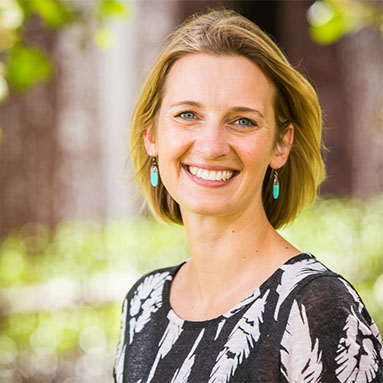
My Expertise
Constitutional law
Judges
Judicial independence and separation of powers
High Court
Government accountability
Government lawyers
Parliamentary law and practice
Constitutional recognition of First Nations
Fields of Research (FoR)
Legal institutions (incl. courts and justice systems), Administrative law, Constitutional law, Aboriginal and Torres Strait Islander political participation and representation, Aboriginal and Torres Strait Islander peoples and the law, Law, gender and sexuality (incl. feminist legal scholarship)SEO tags
Biography
Dr Gabrielle Appleby is a Professor at the Law Faculty of University of New South Wales (Sydney). She researches and teaches in public law, with her areas of expertise including the role, powers and accountability of the Executive; parliamentary law and practice; the role of government lawyers; the integrity of the judicial branch and First Nations constitutional recognition. She is the Director of The Judiciary Project at the Gilbert +...view more
Dr Gabrielle Appleby is a Professor at the Law Faculty of University of New South Wales (Sydney). She researches and teaches in public law, with her areas of expertise including the role, powers and accountability of the Executive; parliamentary law and practice; the role of government lawyers; the integrity of the judicial branch and First Nations constitutional recognition. She is the Director of The Judiciary Project at the Gilbert + Tobin Centre of Public Law, the constitutional consultant to the Clerk of the Australian House of Representatives and a member of the Indigenous Law Centre. Gabrielle was the founding editor of Australia’s national public law blog, AUSPUBLAW (www.auspublaw.org). In 2015-2018, Gabrielle was a Chief Investigator on the ARC Discovery Project, Law, Order and Federalism, looking at the effects of the High Court’s chapter III jurisprudence on State government law and order policy development. In 2016-2017, she worked as a pro bono constitutional adviser to the Regional Dialogues and the First Nations Constitutional Convention that led to the Uluru Statement from the Heart. Her books include The Judge, The Judiciary and the Court: Individual, Collegial and Institutional Judicial Dynamics in Australia (Cambridge University Press, 2021), Judicial Federalism in Australia (Federation Press, 2021), Australian Public Law (3rd ed, Oxford University Press, 2018), The Role of the Solicitor-General: Negotiating Law, Politics and the Public Interest (Hart Publishing, 2016); The Critical Judgments Project: Re-reading Monis v The Queen (Federation Press, 2016) and The Tim Carmody Affair (NewSouth Publishing, 2016). Gabrielle has also spent time working for the Queensland Crown Solicitor and the Victorian Government Solicitor’s Office.
My Grants
|
2017 |
UNSW Research Infrastructure Fund
|
Edited Collections (Law): Metadata Repository & Research Metrics Scoping Study
|
$122, 452 |
Gabrielle Appleby (Project Leader) Simone Degeling, Philip Chung, Kathy Bowrey |
|
2014-17 |
Australian Research Council |
Law, Order and Federalism DP 140101218 |
$328,000 |
James Stellios (ANU) John Williams (UA) Gabrielle Appleby (UA)
|
|
2015-18 |
Australian Research Council and 15 partner universities |
The Australasian legal history libraries stage II LE150100051
|
$800,000
|
Lead Chief Investigator: Graham Greenleaf (UNSW) Personnel from 15 Universities, including: Gabrielle Appleby (UA) |
My Qualifications
PhD, University of Adelaide, 2012
LLM, University of Melbourne, 2009
LLB, University of Queensland, 2005
My Awards
|
2018 |
Fellow |
Australian Academy of Law |
|
2017 |
Highly Commended, Academic of the Year |
NSW Women Lawyers Assn |
|
2017 |
Shortlisted, History Prize for The Tim Carmody Affair: Australia’s greatest judicial crisis
|
Queensland Literary Awards |
|
2015 |
Shortlisted, Zines Prize for best law review article |
Federal Law Review |
|
2014 |
Dean’s Commendation for Excellence in Research |
University of Adelaide |
|
2012 |
University Medal (PhD) |
University of Adelaide |
|
2012 |
Dean’s Commendation for Doctoral Thesis Excellence
|
University of Adelaide |
|
2012 |
Bonython Prize for best original thesis
|
Law School University of Adelaide |
|
2010 |
Australian Postgraduate Award (PhD) |
Commonwealth Government University of Adelaide
|
|
2010 |
Zelling-Gray Scholarship (PhD) |
Law School University of Adelaide
|
|
2007 |
Betty Patterson Commemorative Award (to undertake LLM at the University of Melbourne)
|
Australian Federation of University Women (Queensland Branch) Fellowship |
My Research Supervision
Supervision keywords
Areas of supervision
I would be interested in supervising in the areas of judicial independence, executive government and power, government lawyers and government accountability, and parliamentary law and practice.
Currently supervising
Genna Churches, UNSW, ''Mass Surveillance and Data Retention in Australia' (with Paul Kildea)
Jemimah Roberts, UNSW, "Constitutional Interpretation in the High Court: Revisiting Genealogical, Genetic and Functional Comparison" (with Rosalind Dixon)
Joshua Gibson, UNSW, "Public law amicus and rights-based change: assessing the Australian experience' (with Sean Brennan)
Shakhawat Hossain, UNSW, "Judges social media use and its impact on the integrity of the judicial process in South Asia" (with Janina Boughey)
My Engagement
I am committed to engagement with the broader community, and regularly disseminate my research to the public through leading media forums, including opinion pieces in The New York Times, The Sydney Morning Herald, The Australian, the Australian Financial Review, and The Conversation. I have appeared as a commentator on national and international media (eg, BBC World Service, 7:30, The Project, Lateline, The Drum, Radio National Breakfast, Radio National’s Drive, and Sky News). I am the co-editor of Australia's leading public law blogging platform, AUSPUBLAW.org, and the www.Indigconlaw.org blog.
I am the constitutional consultant to the Clerk of the Commonwealth House of Representatives and regularly undertake consultancy work on constitutional issues for governments, parliaments and NGOs.